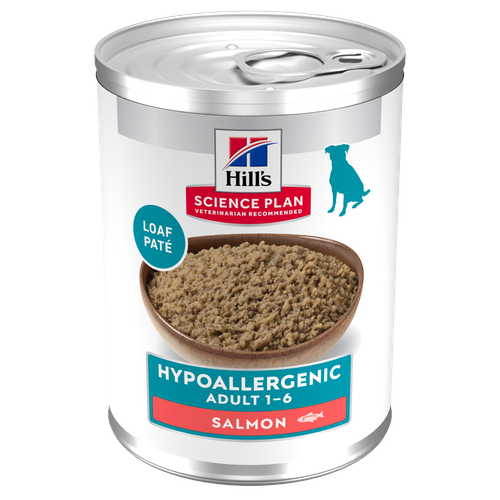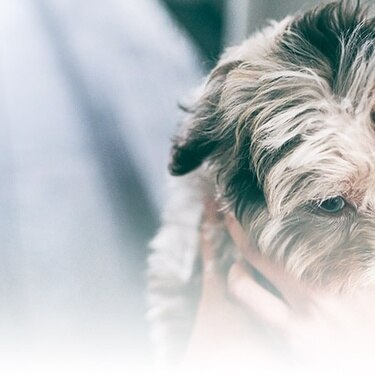
-
Find the right food for your petTake this quiz to see which food may be the best for your furry friend.Find the right food for your petTake this quiz to see which food may be the best for your furry friend.Featured products
 Perfect Weight Small & Mini Adult Dog Food
Perfect Weight Small & Mini Adult Dog FoodHill's Science Plan Adult Small & Mini Dog Food with Turkey is a complete premium pet food for adult small dogs from 1 year old that are prone to weight gain or slightly overweight. This deliciously smooth mousse is formulated to deliver the appropriate amount of energy to support weight maintenance in adult dogs.
Shop Now Perfect Digestion Small & Mini Adult Dog Food
Perfect Digestion Small & Mini Adult Dog FoodHill's Science Plan Perfect Digestion Small & Mini Adult Dog Food with Turkey is a complete premium pet food for small breed adult dogs aged 1–6 years. This deliciously smooth mousse is precisely balanced to deliver the appropriate amount of energy and to support digestive health in adult, small breed dogs.
Shop Now Sensitive Stomach & Skin Dog Food
Sensitive Stomach & Skin Dog FoodHill's Science Plan Sensitive Stomach & Skin Adult Wet Dog Food with Chicken is a complete premium dog food for adult dogs from 1 year. This savoury tinned loaf is enriched with ingredients that support digestive health & skin care.
Shop NowFeatured products Mature Adult Wet Cat Food with Chicken
Mature Adult Wet Cat Food with Chicken
Tender chicken chunks in gravy for mature adult cats. Made with easy-to-digest ingredients, high-quality protein for lean muscle maintenance and antioxidant vitamins C+E for optimal health.
Shop Now Light Adult Multipack Wet Cat Food with Chicken & Ocean Fish
Light Adult Multipack Wet Cat Food with Chicken & Ocean FishTender chicken chunks in gravy for cats, with L-carnitine and fewer calories for ideal weight management. Packed with high-quality protein, omega-6s, and vitamin E for shiny fur and healthy skin.
Shop Now Adult Multipack Wet Cat Food with Beef, Ocean Fish & Chicken
Adult Multipack Wet Cat Food with Beef, Ocean Fish & ChickenTender chunks in gravy for cats, with high-quality protein to maintain lean muscle. With vitamin E and omega-3s & -6s for healthy skin and balanced minerals to support healthy vital organs.
Shop Now -
Dog
- Dog Tips & Articles
-
Health Category
- Weight
- Food & Environmental Sensitivities
- Urinary
- Digestive
- Joint
- Kidney
-
Life Stage
- Puppy Nutrition
- Adult Nutrition
- Senior Nutrition
Cat- Cat Tips & Articles
-
Health Category
- Weight
- Skin & Food Sensitivities
- Urinary
- Digestive
- Kidney
-
Life Stage
- Kitten Nutrition
- Adult Nutrition
Featured articles The Incredible Science Behind Your Pet's Microbiome
The Incredible Science Behind Your Pet's MicrobiomeLearn what your pet's microbiome is, how it contributes to your pet's gut and overall health, and why nutrition is important in maintaining healthy microbiomes.
Read More The Right Diet For Your Pet
The Right Diet For Your PetIn people, the right diet is very important. If you are eating the wrong way for your metabolism, activity level, age and lifestyle you could end up with health issues.
Read More Show some love with wet foods: a great choice for pets with health issues
Show some love with wet foods: a great choice for pets with health issuesShow some love with wet foods: a great choice for pets with health issues.
Read More -


Consider the source
If you’re looking for a new dog, be sure to source your new puppy only from a responsible breeder. The RSPCA has some good tips for what to look for in a breeder. Always ask the breeder to complete and sign the puppy contract. This will help ensure that they’re done everything to ensure good health. If they won’t sign, walk away.
Before going to a breeder, always consider getting a dog of any age from a reputable adoption organisation such as the Blue Cross. There are hundreds of loveable dogs of all ages in adoption centres, just waiting for a forever home of their own, so check your options carefully before you choose your next four-legged family member!
Get your dog a degree!
Well-trained and properly socialised pets make happier, better companions – pure and simple. There is a wide range of organisations offering training and socialisation classes for dogs, so be sure your dog gets an advanced education! Even an old dog can learn new tricks. With the right knowledge under their belt, your dog will be a better-behaved best friend in all kinds of situations. Being able to rely on your dog’s appropriate behaviour will make every interaction more fun for both of you.
Always make sure you go to training classes that are reward-based. Punishment-based training is still common but will ruin your friendship with your dog.
Act in an emergency
Hopefully you’ll never need to put it into practice, but it’s vital to know first aid for dogs in case of an accident or sudden illness. Several organisations, such as the Blue Cross, offer a wealth of useful info online to get you started. Try a simple search with the keywords “first aid for dogs” or “pet first aid”. You’ll also find dozens of books and apps on canine first aid.
It’s essential to get your dog to a vet immediately if an emergency occurs – nothing can take the place of prompt, hands-on professional care from a qualified and experienced veterinary surgeon.
It’s also important to have a plan in place for your dog’s care in case you are ill or otherwise unable to care for them temporarily. Enlist a trusted friend to act as an emergency carer for your dog.


Tasty Tips
To neuter or not to neuter?
Speak with your vet about whether or not neutering is right for your dog. Consider all sides of the matter carefully and choose what’s right for your individual pet. Animal adoption centres are often bursting at the seams with unwanted pets awaiting loving forever homes, so if you choose not to spay or neuter your dog, you’ll need to be extra vigilant about not contributing to the number of unplanned litters already born each year.
Keep moving!
Keeping your dog active will not only keep them entertained and exercised – and less likely to act up – it also helps the two of you to form a much stronger bond. Your dog will relish the attention, and you’ll both keep fit, too!
Dogs need two or three walks every day, no matter what the weather, unless your vet has advised otherwise for a medical reason. Remember that dogs might not necessarily enjoy the same sports as us, like running next to a bike. They love, and need, to have plenty of time to sniff and explore and forage for smells and nature. If you can find woods and parks where you can let them explore and play as they choose, they’ll be very happy.
Feed the right food
Ask your vet about the best food to feed your puppy or dog. You need to consider your dog’s age, lifestyle, breed and general activity level carefully before choosing their food. Large and small breed puppies have different needs when it comes to growing up and growing old, and puppies should not be fed adult dog food. Be sure to support your dog’s individual needs properly throughout their life by giving the precise nutrition they need at each stage.
Watch the waistline
Helping your dog to avoid getting fat – or even a bit chubby – is one of the best things you can do to support their overall physical and emotional health. Overweight or obese dogs can have a shorter lifespan than their healthy-weight pals, and they often have a reduced quality of life as well. Keeping your dog at their ideal weight will help them stay active and healthy longer, and will help them better participate in fun family time with you. If your dog has already packed on some extra padding, help them shed it by asking your vet for advice on the best food for safe and effective weight loss.
There are many ways to be a responsible dog owner, and these are just a few examples of savvy, responsible pet parenting.
Reviewed by Dr. Hein Meyer, DVM, PhD, Dipl-ECVIM-CA and Dr. Emma Milne BVSc FRCVS


One of our staff authors prepared this article for you
Related products

Hill's Science Plan Mature Adult Multipack Wet Dog Food with Chicken & Beef are complete premium pet foods for mature adult dogs from 7 years. Your dog will love these deliciously smooth and savoury minced loaves, formulated to deliver the appropriate amount of energy to support the needs of adult dogs.

Hill's Science Plan Puppy Multipack Wet Dog Food with Chicken & Beef are complete premium pet foods for growing puppies from weaning until 1 year old and for pregnant and nursing dogs. Your puppy will love these deliciously smooth and savoury minced loaves, formulated for balanced nutrition and overall health.

Hill's Science Plan Adult Multipack Wet Dog Food with Chicken, Beef & Turkey are complete premium pet foods for adult dogs from 1 year. Your dog will love these deliciously smooth and savoury minced loaves, formulated for balanced nutrition and overall health.

Hill's Science Plan Hypoallergenic Adult Wet Dog Food with Salmon is a complete premium pet food for all adult dogs from 1 year. This savoury tinned loaf is specially formulated for dogs with delicate skin and stomachs. It features a single novel animal protein source and is grain-free.
Related articles

Learn effective tips for feeding a dog that's a picky eater and ensure proper nutrition for a finicky eater. Discover tips for pet parents at Hill's Pet UK.

Many human foods are dangerous to dogs. Read about 5 of the worst toxic food offenders that can kill your dog - and how much it takes to hurt them.

Learn about the potential health risks of a raw diet for dogs and why they aren't the best option for your pup or you.

How, when and what to feed your new puppy is an important decision, learn more about the things to consider for feeding your puppy.

Put your dog on a diet without them knowing
Our low calorie formula helps you control your dog's weight. It's packed with high-quality protein for building lean muscles, and made with purposeful ingredients for a flavourful, nutritious meal. Clinically proven antioxidants, Vitamin C+E, help promote a healthy immune system.
Put your dog on a diet without them knowing
Our low calorie formula helps you control your dog's weight. It's packed with high-quality protein for building lean muscles, and made with purposeful ingredients for a flavourful, nutritious meal. Clinically proven antioxidants, Vitamin C+E, help promote a healthy immune system.

